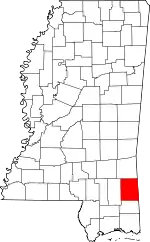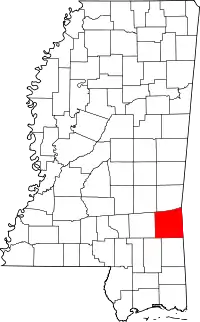State Line, Mississippi
State Line is a town in Greene and Wayne counties, Mississippi, in the United States. The population was 452 at the 2020 census.[2]
State Line, Mississippi | |
|---|---|
 Location of State Line, Mississippi | |
 State Line, Mississippi Location in the United States | |
| Coordinates: 31°26′16″N 88°28′34″W | |
| Country | United States |
| State | Mississippi |
| Counties | Greene, Wayne |
| Area | |
| • Total | 4.30 sq mi (11.13 km2) |
| • Land | 4.26 sq mi (11.04 km2) |
| • Water | 0.03 sq mi (0.09 km2) |
| Elevation | 253 ft (77 m) |
| Population (2020) | |
| • Total | 452 |
| • Density | 106.00/sq mi (40.93/km2) |
| Time zone | UTC-6 (Central (CST)) |
| • Summer (DST) | UTC-5 (CDT) |
| ZIP code | 39362 |
| Area code | 601 |
| FIPS code | 28-70320 |
| GNIS feature ID | 0678229 |
History
A post office was established in 1856, and the town incorporated in 1875. State Line was located on the Mobile and Ohio Railroad, built through Mississippi in the 1850s. The next station north was in Eret, 2.5 miles (4.0 km) away.[3]
Geography
State Line is located at 31°26′16″N 88°28′34″W (31.437799, -88.476104).[4] The town is on the border between Wayne County on the north and Greene County on the south, with the town's area approximately equally in both.[5] In the 2010 census, 304 of the town's 565 residents (53.8%) lived in Greene County and 261 (46.2%) in Wayne County.[6][7]
The town center is 1.5 miles (2.4 km) west of the Alabama–Mississippi border. U.S. Route 45 passes through the northeast corner of the town, leading northwest 20 miles (32 km) to Waynesboro, the Wayne County seat, and southeast 63 miles (101 km) to Mobile, Alabama. Mississippi Highway 57 passes through the east side of State Line, leading south 23 miles (37 km) to Leakesville, the Greene County seat. Mississippi Highway 42 passes through the center of State Line as St. Peter Street, leading west 53 miles (85 km) to Hattiesburg.
According to the United States Census Bureau, the town of State Line has a total area of 4.30 square miles (11.1 km2), of which 4.27 square miles (11.1 km2) is land and 0.03 square miles (0.078 km2) (0.70%) is water.[8]
Demographics
| Census | Pop. | Note | %± |
|---|---|---|---|
| 1880 | 97 | — | |
| 1900 | 379 | — | |
| 1910 | 363 | −4.2% | |
| 1930 | 358 | — | |
| 1940 | 542 | 51.4% | |
| 1950 | 492 | −9.2% | |
| 1960 | 653 | 32.7% | |
| 1970 | 598 | −8.4% | |
| 1980 | 484 | −19.1% | |
| 1990 | 395 | −18.4% | |
| 2000 | 555 | 40.5% | |
| 2010 | 565 | 1.8% | |
| 2020 | 452 | −20.0% | |
| U.S. Decennial Census[9] | |||
| Race | Number | Percentage |
|---|---|---|
| White (NH) | 184 | 40.71% |
| Black or African American (NH) | 245 | 54.2% |
| Native American or Alaska Native (NH) | 3 | 0.66% |
| Asian (NH) | 1 | 0.22% |
| Some Other Race (NH) | 1 | 0.22% |
| Mixed/Multi-Racial (NH) | 11 | 2.43% |
| Hispanic or Latino | 7 | 1.55% |
| Total | 452 |
As of the 2020 United States census, there were 452 people, 250 households, and 176 families residing in the town.
As of the census[13] of 2000, there were 555 people, 197 households, and 148 families residing in the town. The population density was 130.1 inhabitants per square mile (50.2/km2). There were 230 housing units at an average density of 53.9 per square mile (20.8/km2). The racial makeup of the town was 42.70% White, 56.94% African American, and 0.36% from two or more races.
There were 197 households, out of which 39.1% had children under the age of 18 living with them, 41.1% were married couples living together, 29.9% had a female householder with no husband present, and 24.4% were non-families. 21.8% of all households were made up of individuals, and 9.6% had someone living alone who was 65 years of age or older. The average household size was 2.82 and the average family size was 3.29.
In the town, the population was spread out, with 34.4% under the age of 18, 11.4% from 18 to 24, 26.8% from 25 to 44, 16.8% from 45 to 64, and 10.6% who were 65 years of age or older. The median age was 28 years. For every 100 females, there were 82.6 males. For every 100 females age 18 and over, there were 72.5 males.
The median income for a household in the town was $22,500, and the median income for a family was $27,083. Males had a median income of $26,563 versus $20,625 for females. The per capita income for the town was $9,030. About 28.4% of families and 33.6% of the population were below the poverty line, including 46.9% of those under age 18 and 25.4% of those age 65 or over.
Education
The Wayne County portion of State Line is served by the Wayne County School District. The Greene County portion is served by the Greene County School District.
Notes
References
- "2020 U.S. Gazetteer Files". United States Census Bureau. Retrieved July 24, 2022.
- "Geographic Identifiers: 2010 Demographic Profile Data (G001): State Line town, Mississippi". American Factfinder. U.S. Census Bureau. Retrieved December 20, 2016.
- Howe, Tony. "State Line, Mississippi". Mississippi Rails. Retrieved March 21, 2014.
- "US Gazetteer files: 2010, 2000, and 1990". United States Census Bureau. February 12, 2011. Retrieved April 23, 2011.
- "American FactFinder Reference Map". Archived from the original on March 10, 2007. Retrieved July 2, 2006.
- "Geographic Identifiers: 2010 Demographic Profile Data (G001): State Line town (part), Greene County, Mississippi". American Factfinder. U.S. Census Bureau. Archived from the original on February 13, 2020. Retrieved December 20, 2016.
- "Geographic Identifiers: 2010 Demographic Profile Data (G001): State Line town (part), Wayne County, Mississippi". American Factfinder. U.S. Census Bureau. Archived from the original on February 13, 2020. Retrieved December 20, 2016.
- "Census 2000 U.S. Gazetteer Files: Places". United States Census. Archived from the original on December 17, 2002. Retrieved February 9, 2011.
- "Census of Population and Housing". Census.gov. Retrieved June 4, 2015.
- "Explore Census Data". data.census.gov. Retrieved June 1, 2022.
- https://www.census.gov/
- "About the Hispanic Population and its Origin". www.census.gov. Retrieved May 18, 2022.
- "U.S. Census website". United States Census Bureau. Retrieved January 31, 2008.

